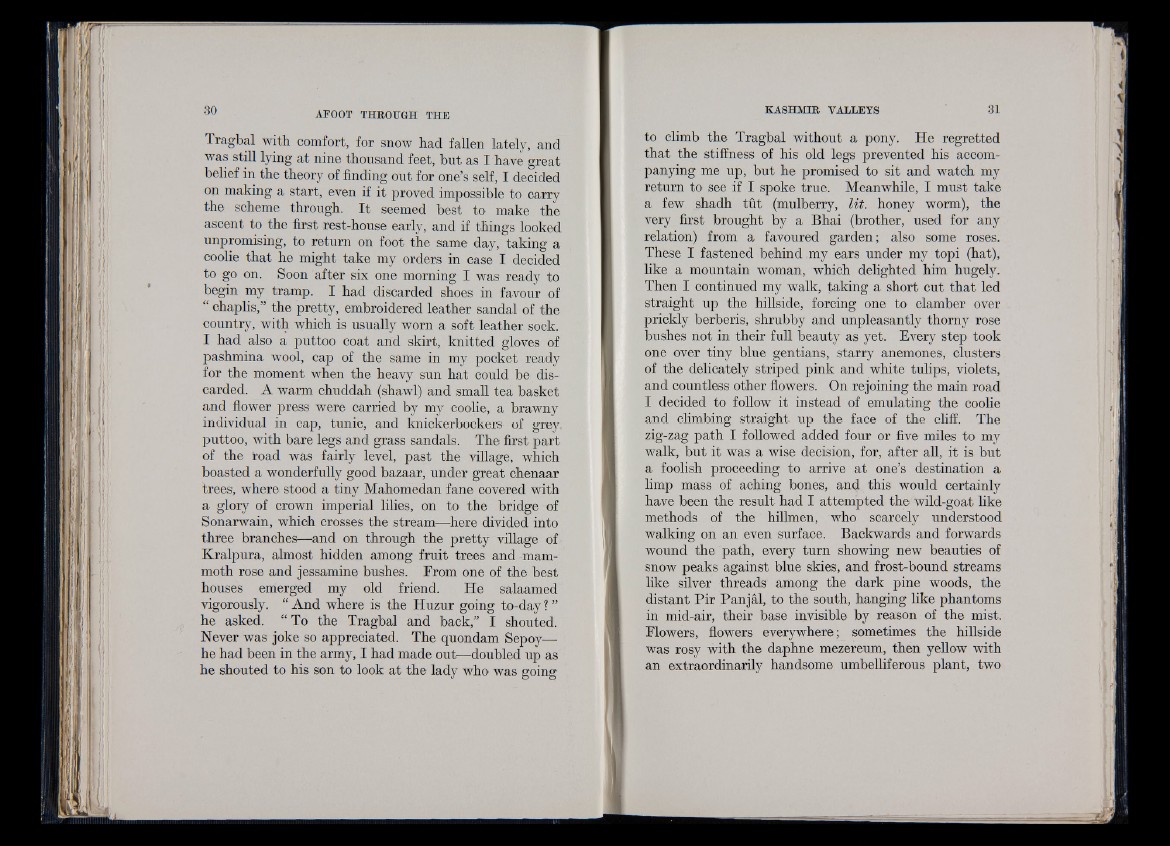
Tragbal with comfort, for snow had fallen lately, and
was still lying at nine thousand feet, but as I have great
belief in the theory of finding out for one’s self, I decided
on making a start, even if it proved impossible to carry
the scheme through. I t seemed best to make the
ascent to the first rest-house early, and. if things looked
unpromising, to return on foot the same day, taking a
ooolie that he might take my orders in case I decided
to go on. Soon after six one morning I was ready to
begin my tramp. I had discarded shoes in favour of
“ chaplis,” the pretty, embroidered leather sandal of the
country, with which is usually worn a soft leather sock.
I had also a puttoo coat and skirt, knitted gloves of
pashmina wool, cap of the same in my pocket ready
for the moment when the heavy sun hat could be discarded.
A warm chuddah (shawl) and small tea basket
and flower press were carried by my coolie, a brawny
individual in cap, tunic, and knickerbockers of grey,
puttoo, with bare legs and grass sandals. The first part
of the Toad was fairly level, past the village, which
boasted a wonderfully good bazaar, under great chenaar
trees1, where stood a tiny Mahomedan fane covered with
a glory of crown imperial lilies, on to the bridge of
Sonarwain, which crosses the stream—here divided into
three branches—and on through the pretty village of
Kralpura, almost hidden among fruit trees and mammoth
rose and jessamine bushes. From one of the best
houses emerged my old friend. He salaamed
vigorously. “ And where is the Huzur going to-day ? ”
he asked. “ To the Tragbal and back,” I shouted.
Never was joke so appreciated. The quondam Sepoy—
he had been in the army, I had made out—doubled up as
he shouted to his son to look at the lady who was going
to climb the Tragbal without a pony. He regretted
that the stiffness of his old legs prevented his accompanying
me up, but he promised to sit and watch my
return to see if I spoke true. Meanwhile, I must take
a few shadh tu t (mulberry, lit. honey worm), the
very first brought by a Bhai (brother, used for any
relation) from a favoured garden; also some roses.
These I fastened behind,my ears under my topi (hat),
like a mountain woman, which delighted him hugely.
Then I continued my walk, taking a short cut that led
straight up the hillside, forcing one to clamber over
prickly berberís, shrubby and unpleasantly thorny rose
bushes not in their full beauty as yet. Every step took
one over tiny blue gentians, starry anemones, clusters
of the delicately striped pink and white tulips, violets,
and countless other flowers. On rejoining the main road
I decided to follow it instead of emulating the coolie
and climbing straight up the face of the cliff. The
zig-zag path I followed added four or five miles to my
walk, but it was a wise decision, for, after all, it is but
a foolish proceeding to arrive at one’s destination a
limp mass of aching bones, and this would certainly
have been the result had I attempted the wild-goat like
methods of the hillmen, who scarcely understood
walking on an even surface. Backwards and forwards
wound the path, every turn showing new beauties of
snow peaks against blue skies, and frost-bound streams
like silver threads among the dark pine woods, the
distant Pir Pan jal, to the south, hanging like phantoms
in mid-air, their basé invisible by reason of the mist.
Flowers, flowers everywhere; sometimes the hillside
was rosy with the daphne mezereum, then yellow with
an extraordinarily handsome umbelliferous plant, two